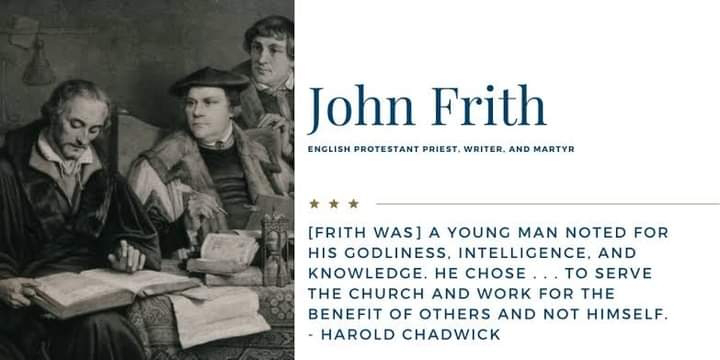July 4
John Frith, the man of peace and purity was burned to death at the stake on July 4, 1533 at the age of 30 because he had quoted scriptures to argue that the bread and wine do not actually turn into Jesus' flesh and blood. He also denied that there is a purgatory after death.
He was born at Westerham in Kent in 1503. The family moved to Sevenoaks where his father became an innkeeper. He was educated at Eton College before attending King's College. His tutor was Stephen Gardiner. Frith's abilities as a scholar were noticed by Cardinal Thomas Wolsey and was invited to leave Cambridge University to join his recently formed Cardinal College (afterwards Christ Church) at Oxford University.
During his studies, he became acquainted with William Tyndale who deeply influenced Frith's beliefs. Like Tyndale and Luther, Frith played an influential role in the Protestant Reformation. John Frith came under the influence of Robert Barnes, who had been converted to the ideas of Martin Luther.
On 24th December 1525, Barnes preached a sermon in St Edward's Church, in which he attacked the corruption of the clergy in general and that of Cardinal Thomas Wolsey in particular. He was arrested on 5th February 1526. Miles Coverdale helped him prepare his defence. Taken to London, Barnes appeared before Wolsey and found guilty.
Fearing arrest, John Frith fled to join William Tyndale and Miles Coverdale in Antwerp. Tyndale began work on an English translation of the New Testament. This was a very dangerous activity for ever since 1408 to translate anything from the Bible into English was a capital offence.
He joined William Tyndale in Germany and helped him with his Bible translation. But when he remembered the people in England who did not understand how to come to God, he felt he had to go back, however much danger there was to him.
John Frith's writings are in answer to, or debate with, the beliefs of men such as Bishop John Fisher, Sir Thomas More, and John Rastell. In 1531 Frith published three attacks on the doctrines of purgatory and transubstantiation, which left him, according to his biographers, a wanted man. His views on Eucharist (the Lord's Supper) fell into the hands of a spy. His enemies had intended for him to pay for his heresy with his life.
In England, John Frith was arrested as a vagabond. He dared not give his name lest he be executed; he saved himself by quoting elegant Greek and Latin lines to a local scholar. After his release, he secretly went from place to place preaching. His writings fell into Sir Thomas More's hands which sealed his fate. More, who was chancellor to the king, ordered John Frith arrested. He offered a great reward to anyone who would deliver him over to the authorities. More's agents hunted everywhere for John just as they had hunted everywhere for William Tyndale.
John planned to escape back to the Germany. But he was betrayed as he tried to board his ship. He was sent to prison. While in prison, he prayed to be able to convert at least one of his enemies to the truth. His prayer was heard when Sir Thomas More's son-in-law switched to Protestant views.
Bishop Stephen Gardiner suggested to Henry VIII that an example should be made of John Frith. Henry ordered Frith to recant or be condemned. Frith refused and he was examined at St Paul's Cathedral on 20th June 1533.
He was convicted and taken to Smithfield to be burned. On 4th July 1533, Frith was led to the stake, where he willingly embraced the wood and fire, giving a perfect testimony with his own life. A young man named Andrew Hewitt was chained with him. John encouraged him to trust his soul to God. The men were two hours dying, because the wind blew the fire away from their bodies.
In his revision of Foxe's Book of Martyrs, author Harold Chadwick writes the following about John Frith: "Master Frith was a young man noted for his godliness, intelligence, and knowledge. In the secular world, he could have risen to any height he wished, but he chose, instead, to serve the Church and work for the benefit of others and not himself."
https://spartacus-educational.com/John_Frith.htm
https://www.google.com/amp/s/www.christianity.com/church/church-history/timeline/1501-1600/john-frith-burned-for-beliefs-11629954.html%3famp=1
https://en.m.wikipedia.org/wiki/John_Frith




